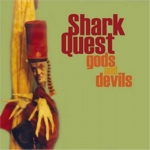|
|
 |
Dusted Reviews
Artist: Shark Quest Album: Gods and Devils Label: Merge Review date: Jan. 19, 2005 |

|
|
|
 |
The material on Gods and Devils, the third album from Chapel Hill’s Shark Quest, was originally composed as the soundtrack to Monster Road, fellow North Carolinians Jim Havercamp and Brett Ingram’s documentary about animator Bruce Bickford. Movie soundtracks written by rock bands are often throwaway exercises, with creative impulses taking a backseat to the demands of the film’s running time. As often as not, the band spends quite a bit of its energy working on background music. Gods and Devils is an exception, primarily because the album re-works the soundtrack material. Really a collection of songs inspired both by the documentary and by Bickford’s acclaimed and obsessively detailed animation, the album stands independent of either as a fine creative achievement. Certainly, it stands as more than mere background music.
Recent post-rock bands – or instrumental rock bands, however you like to think of it – have limited their musical horizons because of their instrumental line-up. The guitar players lead the way, and they do so by playing expanded versions of traditional rock riffs. Shark Quest breaks the second of those clichés, if not the first. Chuck Johnson and Laird Dixon’s guitars are the most prominent instruments on the album, but their influences go much further than just instrumental rock. Instrumental alt-country would be a better approximation, but still seems like an inadequate description. A song like “Katherine of Krakow” sounds like the somber offshoot of country and world music. Throughout Gods and Devils, Johnson, Dixon, and bass player Chris Eubank play a series of tightly wound figures that give each song a sort of instantaneous momentum. The first few minutes of “The Rosetta Barrage,” the album’s opener, highlight Shark Quest’s avoidance of perhaps the two most persistent clichés in recent instrumental rock: the crescendo, and the drawn-out opening jam.
There are downsides. Most of the songs suffer from a sameness in tone, and the first three songs of the album begin to blend together after a few listens. That seems like a vestigial effect of the album’s origins as a soundtrack, though. At any rate, it’s a complaint more pertinent to how someone should listen to Gods and Devils – in more than one sitting, perhaps? – than whether someone should listen to it. With compositions as intricate and superbly detailed as one of Bickford’s animations, it’s certainly worth a listen.
By Tom Zimpleman
|







